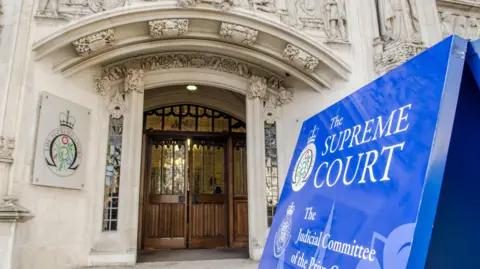David CowanBBC Scotland home affairs correspondent
 Getty Images
Getty ImagesA landmark ruling by the UK Supreme Court could trigger multiple appeals by men convicted of sexual offences in Scotland.
Five judges have ruled that Scotland’s courts have taken an approach to evidence which risks depriving a defendant of their right to a fair trial.
The ruling is expected to result in claims that some cases dating back to 2017 were miscarriages of justice, although it’s impossible to say exactly how many will reach the appeal court or whether they will be successful.
To complicate matters further, the Supreme Court has rejected the appeals by the two convicted sex offenders who had asked it to examine the issue, ruling that their trials had still been fair.
The Law Society of Scotland has welcomed the judgement, saying it will require a change in the way Scottish courts approach sexual offence cases.
The Supreme Court ruling came after an appeal from two men previously convicted of rape, David Daly and Andrew Keir.
They argued that their right to a fair trial was infringed because, at their trials, they were unable to lead evidence or question the complainers or other witnesses about the complainers’ credibility or previous sexual behaviour.
The court dismissed both appeals, saying both accused received fair trials.
However, it also ruled that Scotland’s courts should modify their current approach to the admission of evidence in trials for sexual offences.
The Law Society of Scotland’s president, Patricia Thom, said Scotland had worked hard to ensure complainers in sex offence cases were protected “from unjustified intrusive questioning” while also upholding the accused’s right to present a full and proper defence.
Article 6 of the European Convention on Human Rights guarantees the right to a fair trial for everyone.
But Ms Thom said that in recent years, many in the legal profession had “become concerned that the approach in some cases did not reflect that intended by parliament, resulting in accused persons being denied the right to present potentially relevant evidence at trial.
“It is now clear that Scottish courts will need to revise their approach in these cases and return to the system agreed by the UK and Scottish Parliaments, giving trial judges greater discretion to decide what questions may or may not be asked.”
Disclaimer : This story is auto aggregated by a computer programme and has not been created or edited by DOWNTHENEWS. Publisher: BBC






